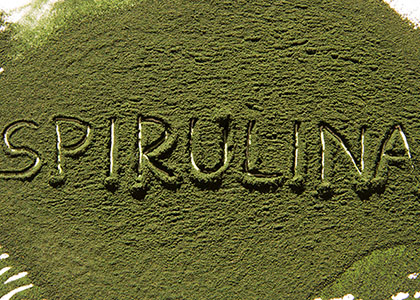
7 Reasons Why Spirulina Is Spectacular
By Claire Georgiou, Reboot Naturopath, B.HSc ND
When it comes to superfoods, spirulina is one of the best. It’s a superfood that is said to contain 100 different nutrients, ranging from protein, essential fatty acids, B vitamins, calcium, iron, magnesium, chlorophyll and more. If you’re not familiar with it, it’s a blue-green algae that has a spiral shape and grows in fresh water ponds, lakes and rivers in warm climates. Historically it was consumed by the Aztecs and in Central Africa as a natural food for additional nutritional needs. It’s most commonly purchased in powder form and is used in many smoothie recipes, like this Green Superfood Smoothie.
Here is a list of spriulina’s many benefits:
- Protein
For its weight, spirulina is approximately 60-70% protein and it is often compared to meat, fish and other rich protein sources due to it being a complete protein. It is important to note that it is unlikely/impossible that people would consume 100g of spirulina, while consuming this amount of protein from other food sources is easy.It is certainly an excellent add-on to increase your natural protein. 5-15g of spirulina provides approximately 3-9g protein.
- Iron
Just 1-2 teaspoons of spirulina provides 1.5-3g of iron which is up to 22% of your recommended daily intake (RDI). Iron is important for energy, immune health and healthy hair, skin and nails.
- B Vitamins
Spirulina contains B1, B2, B3, B5, B6, and B9. Vitamin B1 and B2 are particularly high coming in at 20% of your RDI at 2 teaspoons, these vitamins are particularly helpful for improving energy production.It’s important to note that spirulina is often regarded as a good source of B12 but unfortunately studies indicate that it is an un-absorbable form (pseudo-vitamin B12) to humans.
- Antioxidants
Spirulina contains antioxidants such as beta-carotene, zeaxanthin, lutein, xanthophylls and other important carotenoid compounds. These nutrients are important for skin, eyes, heart and immune health.
- Chlorophyll
Research suggests that this green pigment that’s involved in photosynthesis is useful in promoting good health. It has a powerful de-odorising effect, helps reduce hunger, supports cellular healing, acts as an antioxidant against free-radicals and supports healthy blood and cellular oxygenation and energy.
- Alkaline
It is a very alkalising food that also thrives in very alkaline water such as large lakes in warm climates. Alkalising foods help to reduce systemic inflammation.
- GLA
This is a fatty acid that is present in human milk and is also found in small amounts in some plant foods such as spirulina.
There are some studies to support the use of spirulina for:
- Allergies to help reduce histamine release
- Immunity to fight against infections and cancer
- Improve growth of healthy gut flora
- High cholesterol to exhibit a cholesterol and triglyceride lowering effect
- Improved energy and metabolic health
- Protects against liver disease and liver damage
It can also be used as a nutritional chelating agent (this helps remove some heavy metals and improve their elimination out of the body).
Spirulina is particularly beneficial for people who are:
- Not eating enough greens (including children)
- Pregnant and nursing – due to increased nutritional needs
- Busy/stressed – improved nutrition to support higher energy levels and vitamin B requirements
- Elderly – that may have reduced appetites and/or nutrient absorption
- Suffering with digestive/absorption issues – people who may have had stomach bypass surgery that have limited absorption capacity or poor digestion
- Vegetarians/vegans – to support and improve iron and B vitamins intake
Spirulina is great for anyone and can be added to food and drinks easily to increase their nutritional intake and can be taken multiple times a day for a quick pick me up.
It is important to note that spirulina is often compared nutritionally to foods such as liver, beef, fish, kale, spinach and milk for its iron, calcium and protein content. Spirulina is a concentrated food source but you can only consume small amounts in weight and it will not provide the nutrient quantities that are promised in comparison to other foods. Spirulina is a wonderful add-on to a healthy diet for improved health and well-being.
The dosage recommendation is 3 – 15 g per day. This can be taken as powder, capsule, tablet or flakes. Adding it to juice, smoothies, water, salads, bliss balls, carob squares and other homemade foods is easy!